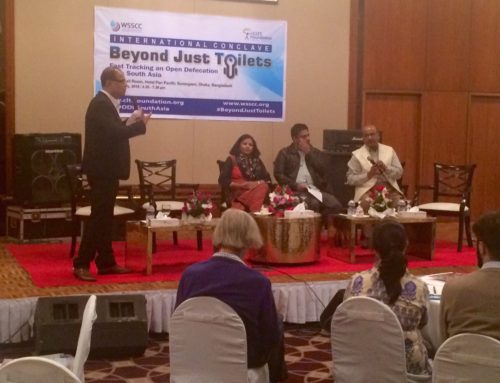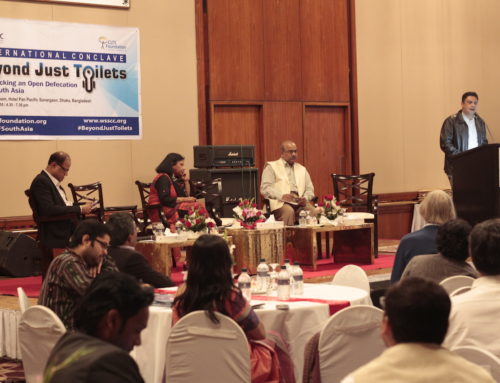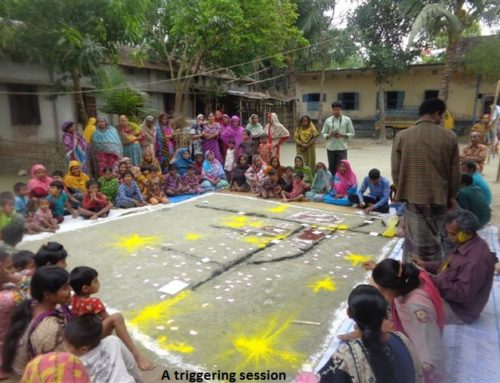-

Stellar show: Pulin Nayak, Suresh Bansfore and Vijay Bansfor — core members of the Young Star Club, which staged plays and campaigned door-to-door to make Harijan Pally open defecation-free. Photo: Rina Mukherji
How Harijan Pally in Nadia, West Bengal, became the epicentre of a clean revolution
In April 2015, Nadia was declared the first open defecation-free district in India. Two more districts in West Bengal — Hugli and Burdwan, and Bikaner in Rajasthan quickly followed Nadia’s act. Here is the story of how the beginning was made in the slums of Kalyani Municipality.
Only a decade ago, Harijan Pally was one of the dirtiest parts of Kalyani Municipality in Nadia district, West Bengal. “People who ever came here on work, would hold their noses; it made us feel so ashamed,” recalls Suresh Bansfor, a resident.
Home to largely Dalits from Bihar and Uttar Pradesh, besides a few other families from Odisha, the 9.26-acre Harijan Pally was overrun by open defecation. Few houses here had toilets, so the residents — daily wage-earners, as also central and state government Class III and Class IV employees among them — used the grounds around the slum instead.
In 2006, when the local municipal body announced a community-led total sanitation (CLTS) programme to end open-defecation in the area, the Young Star Club was one of the first to respond.
Members of the club were already involved in efforts to improve their surroundings. The municipality’s decision to partner with Kamal Kar’s CLTS Foundation gave the club the fillip they were looking for. Supported by the municipality’s health-in-charge Dr Kasturi Bakshi, the club members went door to door, appealing to the residents to build toilets in every home.
They were met with mixed response. A few families had already built toilets but others, like that of daily-wage sweeper Suraj Bansfore, refused to heed. Finally, Suraj learned the hard way — after his five-year-old daughter Kanti was repeatedly down with diarrhoea and gastroenteritis. “I saw Suraj’s wife crying outside their home one morning. Her daughter was unconscious after having loose motions all night. The child needed to be hospitalised, but the mother did not have even ₹10 for the ambulance. We helped her pay,” says Suresh, an active member of the club who is employed as an administrative assistant at Kalyani University.
Suraj initially installed a basic toilet at a cost of ₹300. Now he wants the municipal authorities to build him a proper unit that costs ₹13,000, but is unable to pay the initial contribution of ₹1,000. Once again, the local community has pitched in to help.
The club has come a long way from the stiff resistance it encountered in the early days. Its core committee — comprising Pulin Nayak, Suresh and a few others — used cultural occasions such as Holi and Diwali to stage plays that urged people to build toilets and put an end to open defecation. Their messages linked toilets to health. Flies that sat on faeces in the outdoors could easily contaminate food, and infect people. Children and the elderly were particularly vulnerable; and the money spent on medicine and/or hospitalisation far exceeded the cost of a toilet. Ultimately, “the economics of health was what drove in the point,” Dr Bakshi says.
The slum was made of homes built haphazardly on land belonging to Kalyani University. As a first step, a meeting was arranged and the land was formally handed over to Kalyani Municipality. In consultation with the residents, the municipality and the CLTS Foundation re-constructed the houses in neat rows; next they laid out sewer lines and drains. Houses that could not be realigned were demolished and the families shifted to an alternative plot. Every family opted to build a toilet, and most of them chose the basic model. The municipality distributed free plastic pans to set up single-pit toilets.
Of course, merely building toilets was not guaranteed to end open defecation.
Old habits die hard, so there were many who insisted on using the outdoors as they had done for many years.
The club took to shaming them. Little children were given whistles to raise the alarm when they saw someone using the open grounds to answer nature’s call.
Septuagenarian Shambhu Das hurled his lota in frustration at one such group of vigilant children and community members.
Other slums began to take notice of the CLTS model’s success in Harijan Pally, and the efforts of the Young Star Club in using plays and other media to drive home the message of an open defecation-free environment. “They used an actual pan to explain the working of a pit latrine, and how using toilets can curb diarrhoea and other enteric diseases that stunt growth,” says Dr Bakshi.
Currently, a lease deed is being negotiated for Harijan Pally that will ensure the residents never face eviction in the future.
A roof guaranteed over their heads, the residents appear even more willing to invest in a toilet. Until 2006, the family of railway clerk Bulbul Prasad had no qualms defecating outside. After using an asbestos-lined single-pit toilet for a few years, they are now enthusiastically building a vastly improved bath-and-toilet complex in their compound.
Kishore Bansfor’s house, on the other hand, already had a toilet before the family was shifted to another plot during the slum’s realignment. He has now chosen to build a twin-pit toilet along with a massive tank. His cousin Amit Bansfor, too, had to abandon his old home but has now gained a ₹13,000 government toilet after paying just ₹1,000.
Dr Bakshi lays much of the credit for Harijan Pally’s success story at the door of the Young Star Club and its indefatigable young heroes. Refusing to rest on their laurels, the club has busied itself in making the surroundings free of garbage and filth. Its next campaign will get people to stop throwing plastic and other waste in the open.
Such enthusiasm proved contagious. More communities stepped up to the challenge of cleaning the environment. In fact, in Vidyasagar colony — one of the first slums under Kalyani Municipality to become open defecation-free — the residents recently cleared a filthy, clogged drain that had unfailingly overflowed during every monsoon in the past 12 years. Clearly, enlightened communities can readily empower themselves for a better future.
Community in cahoots
Nearly half of India — 595 million people — defecate in the open, according to Unicef. The country accounts for 59 per cent of the world’s population that does not use toilets. Little wonder then that the country loses 1.88 lakh of its under-five children to diarrhoea every year.
CLTS (community-led total sanitation) relies on “the community taking the initiative to improve its sanitation level, rather than a subsidy-driven, top-down approach”, explains Dr Kamal Kar, who came up with the approach in 1999 while leading an evaluation mission for WaterAid in Bangladesh. It is enough to make people see where the problem lies, and what open defecation can cause in terms of sickness and disease, he says. However, he rues that this approach has been largely ignored, even at a time when the current government has “put the greatest emphasis ever on ending open defecation in India”.
The success of the CLTS approach depends on identifying natural leaders in the community; this must be followed up by the use of the right kind of trainers to help the programme progress to the next phase.
Children can prove to be the best agents for change, and are hence an important part of the programme. Once the entire community realises that they are actually “eating each other’s shit” owing to the practice of open defecation, a collective decision immediately follows to end the practice and build toilets. CLTS has wrought wonders in Bangladesh, Ethiopia, Bolivia, Yemen, Tanzania, Uganda, Pakistan, Indonesia, besides India.
This was first published on the Hindu Business Line by Rina Mukherji. Rina is a Kolkata-based journalist specialising on environmental issues.







Leave A Comment